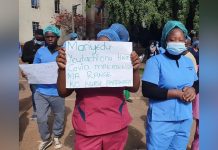When elephants fight, as a Swahili cliché goes, it is the grass that suffers. This aptly describes the situation in Zimbabwe in which medical aid holders find themselves.
The country has been plunged into yet another health crisis, as it emerged this week that medical aid societies are not remitting payments to health service providers.
The Zimbabwe Medical Association (Zima) made shocking revelations on Wednesday that medical aid societies have not been paying for health services in full and on time, with some having outstanding claims dating as far back as 2015. Medical practitioners are now demanding full payment of outstanding claims by health insurers, especially by the Premier Service Medical Aid Society. Failure by the medical aid societies to pay for the health services in full and on time could force doctors to demand cash upfront, as they did between January and March 2004 and in July 2016, also due to late payment by health insurers, and during the economic decline and hyperinflation environment of 2007-2008. Despite being clearly short-changed by medical insurers, we implore doctors not to resort to that.
Instead, government should cancel licences of medical aid societies failing to meet their obligations as threatened to do in 2016. While we sympathise with doctors that their patience is being stretched to the limit, we feel for patients, who have sacrificed to pay subscriptions month after month despite the economic hardships they face.
Members’ contributions have increased twice this year, but this has not translated to reduced shortfalls.
General practitioners are charging between ZW$100 and ZW$200 for consultation and specialist fees range between ZW$450 and ZW$1 800. In some instances, medical aid societies only pay ZW$100 of the fees being charged by physicians, whose fees range between ZW$1 100 and ZW$1 800. There is no doubt that doctors are raising valid points, but they also need to review their fees downwards, considering that salaries in Zimbabwe have remained stagnant.
The disagreements between medical insurers and health providers should not make patients suffer. Patients are already grappling with skyrocketing costs of medical treatment and drugs. Medical doctors and health insurers should find a solution that satisfies both, while easing the cost burden for patients. Zimbabwe is already going through harrowing economic times; they should not add on costs to long-suffering citizens. Government needs to set up a regulatory body to oversee activities of medical aid societies to stop the abuse of subscriptions, as alleged by the doctors. They accused health insurers of paying themselves obscene salaries and perks.
Government should now finalise the Medical Services Amendment Bill that has been on the cards since 2004, which guarantees every citizen and persons with chronic illnesses the right to access basic healthcare services, to basic healthcare for the illness and every person’s right to emergency medical treatment to any health care.
Let us hope the Alpha Media Holdings Zimbabwe International Health Conference on August 6 and 7 at Wild Geese Lodge in Harare will help address these issues.






